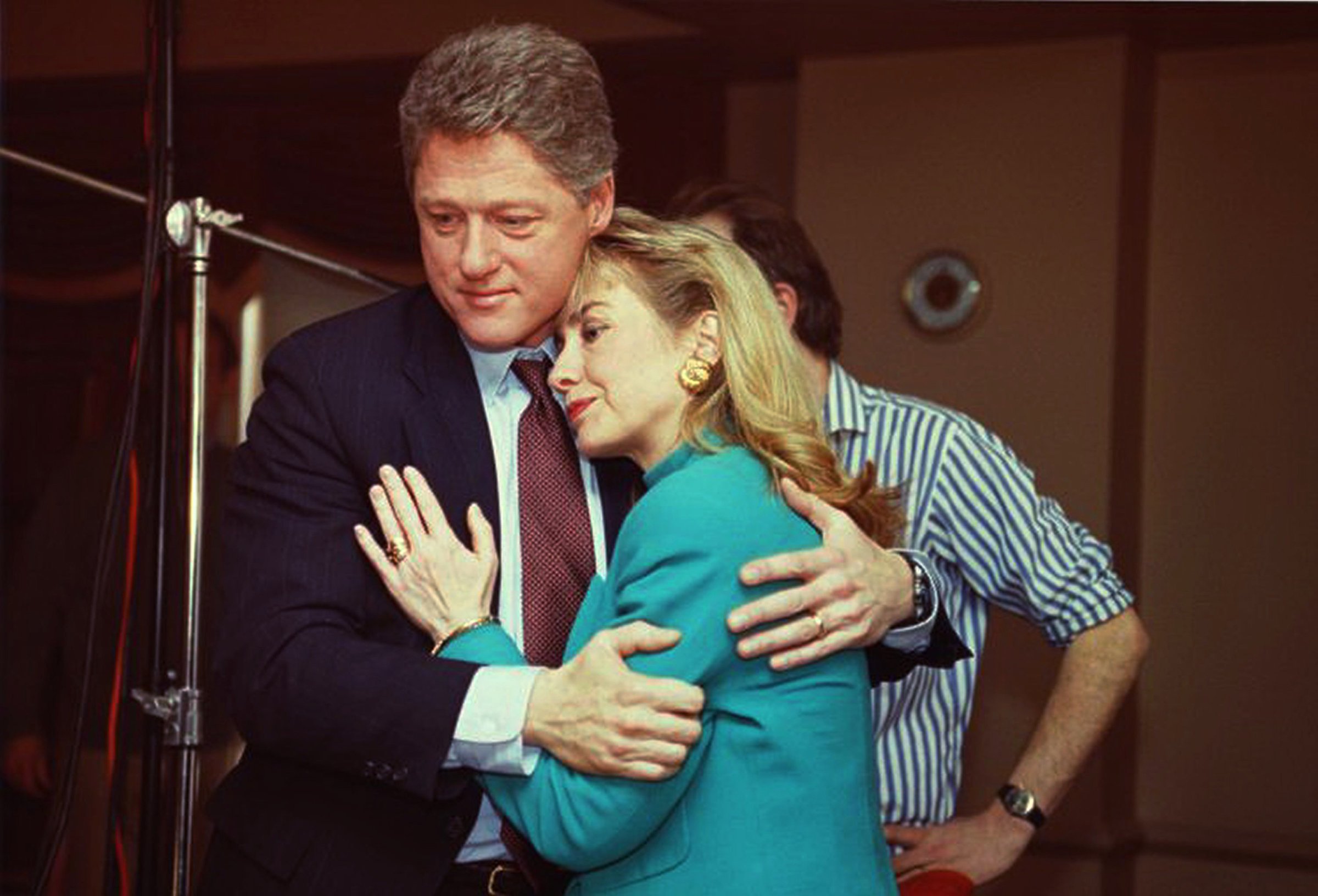
Almost exactly 24 years ago, just before the New Hampshire primary, Bill and Hillary Clinton sat for an excruciating interview with 60 Minutes. His presidential campaign had been consumed by lurid tabloid tales of his infidelities. Submitting to a humiliating series of questions about his sex life was a Hail Mary pass. During the episode, Hillary stares intensely at her husband as he admits to marital wrongdoing but denies specific allegations of an affair with Arkansas TV reporter Gennifer Flowers. Then Hillary says something that will haunt her for years: “You know, I’m not sitting here–some little woman standing by my man like Tammy Wynette. I’m sitting here because I love him and I respect him, and I honor what he’s been through and what we’ve been through together.”
Hillary was immediately slammed for differentiating herself from those “little” women who are reflexively loyal to their husbands. But in a cruel twist, years later, as she struggles to prevail in the early primary states, she’s under attack for standing by her man all those years ago. Bill’s 20th century misdeeds are being revisited in the harsh light of 2016’s moral landscape. And now his wife is being accused of being complicit in his behavior, because she did not speak out, believe his accusers or leave him when the sordid details of sexual misconduct surfaced during the impeachment process in late 1998 and early 1999.
Women now rightly expect to be taken seriously if they make an allegation of sexual abuse. And Hillary’s opponents have not hesitated to turn that liberal triumph into a conservative cudgel. Donald Trump calls Bill an abuser and Hillary his enabler. The New York Times’ editorial board argued that “for decades Mrs. Clinton has helped protect her husband’s political career, and hers, from the taint of his sexual misbehavior, as evidenced by the Clinton team’s attacks on the character of women linked to Mr. Clinton.”
But she was not the only feminist who didn’t abandon Bill when the details of his affair with White House intern Monica Lewinsky were exposed. Many of the feminists who weren’t married to him also remained silent, choosing Bill’s female-friendly policies over individually wronged females. And even now, sympathetic columnists protest, as New York magazine’s Rebecca Traister did in early January, that a wife–whether it’s Hillary Clinton or Camille Cosby–should not be held accountable for her husband’s actions.
That’s a powerful argument, but it skirts a more complicated issue. Should Hillary be blamed for dismissing the women accusing her husband? Back in 1998, Hillary identified a “vast right-wing conspiracy” determined to drive Bill from office. It’s impossible to know how much she truly knew about her husband’s actions–but she certainly knew about their enemies’. So was it a natural reflex for a political wife (or any wife) to believe the best of her spouse and the worst of their opponents, and therefore dismiss the accusations against him, which included not just infidelity but assault and even, in the most fevered precincts, murder?
Today the benefit of the doubt goes to the accuser, not the accused, if not in court then at least in the culture. But does being a feminist now mean siding with the sisterhood, even over your marriage? Does a general commitment to treating accusers with respect automatically include believing a stranger instead of your spouse?
That’s why Hillary has to walk such a perilous line as a candidate. She can’t aggressively defend her husband without looking like she’s bullying his alleged victims, which would alienate her feminist base. Nor can she acknowledge their charges as viable. It’s a double bind. When a woman asked in December how Hillary can say that assault victims should be believed but not address the claims of Juanita Broaddrick, Kathleen Willey or Paula Jones–all women who accused Bill of sexual assault or misconduct–she responded, “I would say that everyone should be believed at first until they are disbelieved based on evidence.” She implied that those cases had been litigated and were no longer an issue.
Perhaps not for Bill, who left office with a 65% approval rating and remains even more popular today. But more young women now view Hillary unfavorably than favorably. And as Michelle Goldberg at Slate has written, the ultimate sexist irony may be that while Bill’s behavior didn’t derail his career, it could end up seriously damaging his wife’s.
More Must-Reads from TIME
- Donald Trump Is TIME's 2024 Person of the Year
- TIME’s Top 10 Photos of 2024
- Why Gen Z Is Drinking Less
- The Best Movies About Cooking
- Why Is Anxiety Worse at Night?
- A Head-to-Toe Guide to Treating Dry Skin
- Why Street Cats Are Taking Over Urban Neighborhoods
- Column: Jimmy Carter’s Global Legacy Was Moral Clarity
Contact us at letters@time.com